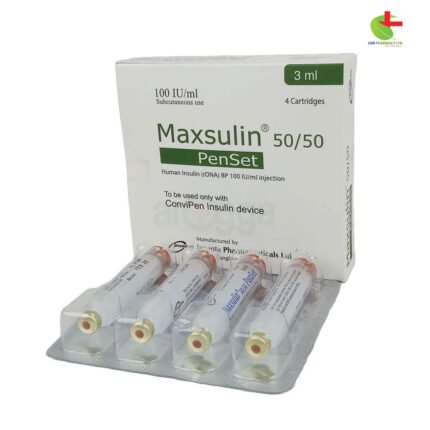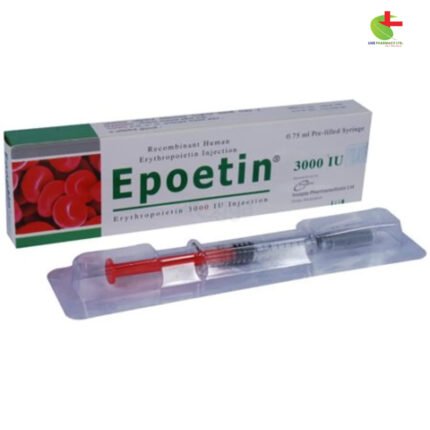Epoetin 2000 IU
1,025.00৳
- Epoetin is a recombinant erythropoietin for treating anemia related to:
- Chronic kidney disease (CKD)
- HIV with zidovudine
- Myelosuppressive chemotherapy
- Elective surgeries
- Anemia of prematurity
- Stimulates red blood cell production and manages hemoglobin levels.
- Dosage varies by patient status and treatment needs; monitoring is crucial.
- Always consult a healthcare professional before use.
 Brand
Brand
|
Incepta Pharmaceuticals Ltd |
|---|---|
 Generics
Generics
|
Erythropoietin Alfa |
Indications
Epoetin, an erythropoiesis-stimulating agent (ESA), is prescribed for the treatment of anemia associated with:
- Chronic Kidney Disease (CKD): Effective for patients both on dialysis and those not undergoing dialysis.
- Zidovudine in HIV-infected patients.
- Myelosuppressive chemotherapy: Recommended for patients starting chemotherapy, ensuring at least two additional months of treatment are planned.
- Surgical patients: Aids in reducing the need for allogeneic RBC transfusions during elective, noncardiac, nonvascular surgeries.
- Anemia of prematurity: For infants weighing between 750 and 1500 grams with a gestational age of less than 34 weeks.
Always follow the guidance of a registered healthcare professional when using this medication.
Description
Epoetin is a recombinant form of human erythropoietin (EPO), produced in Chinese hamster ovary cells. It features a 165 amino acid sequence identical to that of natural human urinary EPO, making them indistinguishable in functional assays. The molecular weight of erythropoietin is approximately 30,400 daltons.
Dosage
Iron and Nutritional Assessment: Before initiating Epoetin alfa therapy, assess the iron status of all patients and ensure adequate iron levels. Address other potential causes of anemia (e.g., vitamin deficiencies, chronic inflammation, bleeding) prior to starting treatment.
For CKD Patients:
- Monitoring: Regularly check hemoglobin levels weekly until stable, then monthly. Adjustments should consider hemoglobin fluctuations.
- Dosage adjustments: Do not increase the dose more often than every 4 weeks; reductions can occur more frequently. If hemoglobin rises too quickly (over 1 g/dL in two weeks), reduce the dose by at least 25%.
- Response Evaluation: If hemoglobin does not improve by more than 1 g/dL after four weeks, increase the dose by 25%. Discontinue if no improvement is seen after 12 weeks of escalating doses.
For Dialysis Patients:
- Start treatment when hemoglobin is below 10 g/dL.
- Reduce or pause Epoetin alfa if hemoglobin exceeds 11 g/dL.
- Recommended initial dose: 50 to 100 units/kg, administered intravenously or subcutaneously three times a week.
For Non-Dialysis CKD Patients:
- Initiate treatment for hemoglobin levels below 10 g/dL, considering the rate of decline and the need for RBC transfusions.
- Recommended initial dose: 50 to 100 units/kg, three times weekly via IV or subcutaneous injection.
For Zidovudine-Treated HIV Patients:
- Starting dose is 100 units/kg, given intravenously or subcutaneously three times weekly.
Dose Adjustments:
- If no hemoglobin increase is noted after 8 weeks, raise the Epoetin alfa dose by 50 to 100 units/kg every 4 to 8 weeks until the desired hemoglobin level is reached or up to a maximum of 300 units/kg.
- Withhold Epoetin alfa if hemoglobin exceeds 12 g/dL; resume at 25% lower when it falls below 11 g/dL.
- Discontinue if no increase is seen at 300 units/kg after 8 weeks.
For Cancer Patients on Chemotherapy:
- Begin treatment if hemoglobin is less than 10 g/dL and chemotherapy is planned for at least two additional months. Use the minimum effective dose to prevent RBC transfusions.
- Adult dosage: 150 units/kg subcutaneously three times weekly or 40,000 units weekly until chemotherapy completion.
- Pediatric patients (ages 5 to 18): 600 units/kg intravenously weekly until treatment completion.
For Premature Infants:
- Administer Epoetin alfa at a dose of 3 x 250 IU/kg weekly, starting as early as day 3 of life. Treatment typically lasts six weeks.
Always consult with a registered healthcare professional when using this medication.
Administration
- Preparation: Do not shake the vial or freeze the product. Protect from light.
- Inspection: Visually check for any particulates or discoloration before administration. Discard if found.
- Storage: Store between 2ºC to 8ºC, ensuring it remains protected from light.
Always consult with a registered healthcare professional when using this medication.
Interactions
There are no significant known drug interactions, but Epoetin’s effects may be enhanced when used alongside iron supplements in cases of deficiency.
Contraindications
- Uncontrolled hypertension.
- Severe allergic reactions to Erythropoietin alfa.
- Patients who develop Pure Red Cell Aplasia (PRCA) post-treatment with any erythropoietin should avoid Erythropoietin alfa.
Side Effects
Common adverse reactions (5% occurrence) in clinical studies include:
- CKD Patients: Hypertension, joint pain, muscle cramps, fever, dizziness, device malfunction, vascular occlusion, and respiratory infections.
- HIV Patients on Zidovudine: Fever, cough, rash, and irritation at the injection site.
- Cancer Patients on Chemotherapy: Nausea, vomiting, muscle pain, joint pain, stomatitis, cough, weight loss, leukopenia, bone pain, rash, elevated blood sugar, headaches, depression, difficulty swallowing, low potassium, and thrombosis.
- Surgery Patients: Nausea, vomiting, itching, headaches, injection site pain, chills, deep vein thrombosis, cough, and hypertension.
- Premature Infants: Decreased serum ferritin levels.
Pregnancy & Lactation
Due to limited controlled studies in pregnant women, Epoetin alfa should be used in pregnancy only if the benefits justify potential risks. It’s not recommended for pregnant or nursing surgical patients involved in blood donation programs. The presence of Epoetin alfa in human milk is unknown, so use with caution during breastfeeding.
Overdose Effects
Epoetin has a wide therapeutic margin. Overdosage may lead to elevated hemoglobin levels, which can be managed by discontinuing or reducing the dose and possibly performing phlebotomy. Severe hypertension may occur following an overdose.
Therapeutic Class
Drugs for Haemolytic Hypoplastic & Renal Anemia.













Reviews
There are no reviews yet.